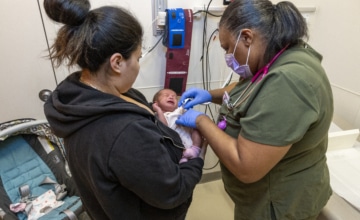By Claire Lerner
Preparing for a second child is a little different than when you were expecting your first.
One major new variable is child number one, who up to this point has experienced the world pretty much revolving around him. Another big factor is that many first-borns are only toddlers themselves when that second baby is on the way, making the concept of a baby growing in mom’s belly pretty hard to grasp. With that in mind, here are some ways you can help make this abstract concept more understandable and help your older child get ready for his new brother or sister.
- Read books about how babies are born after they grow in mom’s “bellies.” The concept of an actual human coming out of a belly is very abstract to a young child. The more you make the unknown known, the less anxiety there will be for the child.
- Read books about having a new brother or sister. Depending on your child’s age, talk about what she thinks it will be like when the baby is born—what will be fun and what might be hard—such as when the baby has to be fed or changed at a time when your child wants to play. Brainstorm activities you can still do at those times, like reading a book as he turns the pages. To avoid setting him up for a rude awakening when reality hits, it’s important to communicate that having a new baby is exciting, but also a big change,
- Invite your child to be involved in baby prep activities. She can help you decorate the baby’s room, pick out toys, clothes, etc., if she is interested. Avoid forcing your child to help because this sends the message that she has to be happy about the new baby, and that she will disappoint you if she doesn’t show excitement or want to be involved.
- Consider inviting your child to attend a few doctor’s visits. You know your child best. Some toddlers enjoy these visits while others will get bored and antsy, taking your attention away from your visit. Keep in mind that viewing a sonogram is very hard for a toddler to make sense of which can cause anxiety. You could also consider sibling prep classes that many hospitals offer. You know your child best, so trust your instincts.
- Create opportunities for your child to be with babies. Point out babies you see when you are out and about. Visit friends who have a new little one and talk about what babies are like—what they can and can’t do, how they behave, and what kind of care they need.
- Expect your child to act out her feelings about the new baby. It is natural and common for first-borns to experience and express confusion and worry as they try to make sense of the changes they see in mom’s body and feel the approach of changes in the family the way he has known it. His behavior may change, which can include becoming clingier, demanding to be carried all the time, starting to wake up in the middle of the night, having potty accidents, or becoming withdrawn or aggressive. Since young children have a hard time understanding and expressing their complex feelings, they act them out. Try to show empathy at these moments while still setting appropriate limits. “You want mommy to pick you up, but that is not possible right now. I know that is frustrating and you are angry. I can hold your hand or you can go in the stroller.” Then follow through as calmly as possible, even in the face of his distress. When he sees you are compassionate but clear about the limit, he is likely to adapt.
Most important to keep in mind is that having that second child is a gift to your first-born; it is not something that should make you feel guilty. At the same time, it’s important to be aware that your first-born picks up on the changes he senses are on the horizon, which causes anxiety about the unknown—how his family will change and what that means for him. Being sensitive to this will help you provide the support and reassurance he needs to adapt to this major life transition.





